British actor Dennis Price (1915-1973) played in nearly 130 films and television plays. He started as a suave leading man and later became a character star of great versatility. He is charismatic and very funny as the devilishly suave psychopath Louis Mazzini in the classic black comedy Kind Hearts And Coronets (1949). He became a popular TV star with the role of butler Jeeves opposite Ian Carmichael as Bertie Wooster in the BBC’s The World Of Wooster (1965-1967), based on the books by P.G. Wodehouse. Anguish about his homosexuality caused many of his personal problems.
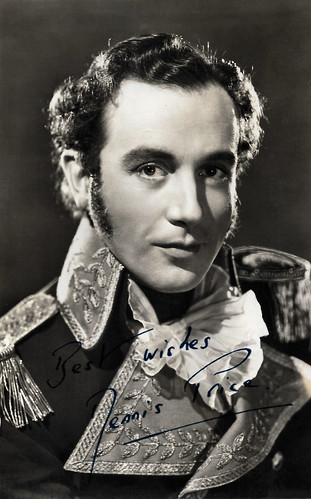
British autograph card. Dennis Price in The Magic Bow (Bernard Knowles, 1946).
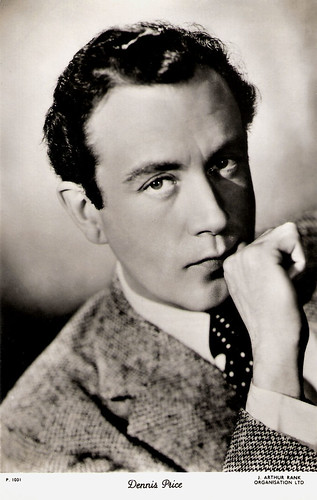
British postcard in the "The People" series by Show Parade Picture Service, London, no. P. 1001. Photo: J. Arthur Rank Organisation Ltd.
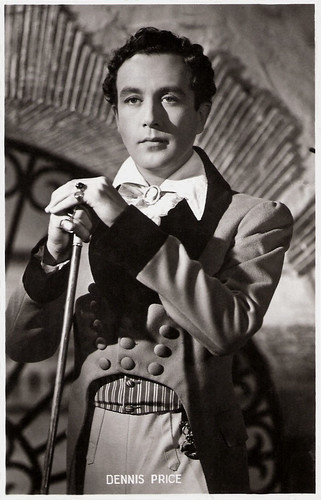
British postcard by Real Photograph, no. F.S. 29. Photo: Gainsborough Pictures. Publicity still for The Bad Lord Byron (David MacDonald, 1949).
Dennis Price was born Dennistoun Franklyn John Rose-Price in 1915, into an upper-class family in Twyford (according to some sources: Ruscomb), England. His father T. Rose-Price was a brigadier-general, and Dennis was expected to make a career for himself in the army or the church.
He was educated at Radley, and at Worcester College, Oxford, where he became a member of the Oxford University Dramatic Society. He did not abide by his family's wishes and decided to become an actor.
Price studied acting at the Embassy Theatre School of Acting. He made his first appearance on stage at the Croydon Repertory Theatre in June 1937, followed by a debut on the London stage in 'Richard II' with John Gielgud in the title role. He was further promoted in the theatre by Noël Coward.
He made his film debut as an extra in the comedy No Parking (Jack Raymond, 1938) with Gordon Harker, and also appeared in early BBC television plays.
In 1939, he met and married the actress Joan Schofield. War put a temporary halt to his acting career. In 1940, he joined the Royal Artillery, where he served until he was wounded in 1942. His brother Arthur Thomas Rose-Price, who had joined the RAF as Flying Officer RAF, was shot down and killed in the Battle of Britain.
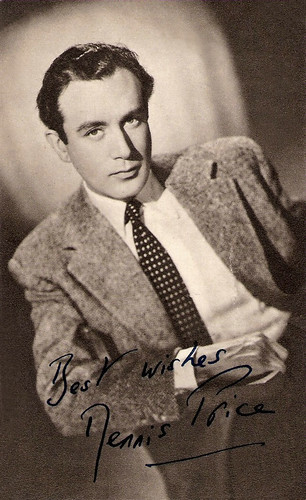
British postcard.
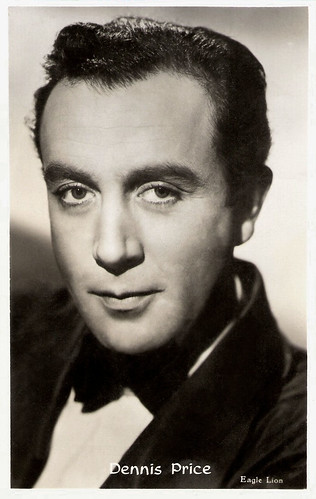
Dutch postcard. Photo: Eagle Lion.

Belgian collectors card, no A 69. Photo: J. Arthur Rank Organisation.
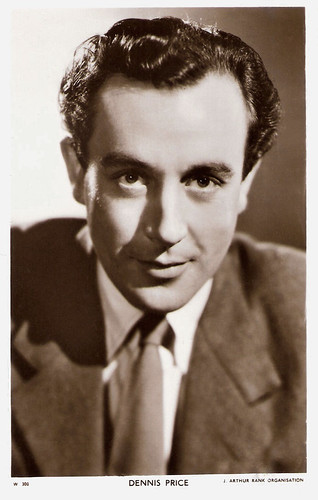
British postcard in the Picturegoer Series, London, no. W. 300. Photo: J. Arthur Rank Organisation.
Dennis Price resumed his career in 1942, touring with Noël Coward in 'This Happy Breed,' and other plays Coward's company produced. Then he was cast by Michael Powell for one of the leading parts in his war drama A Canterbury Tale (Michael Powell, Emeric Pressburger, 1944) with Eric Portman and Sheila Sim. The film was not a box office hit but is now regarded as one in a number of Powell & Pressburger classics.
He impressed Gainsborough Pictures, which put him under contract. According to Brian MacFarlane at BFI screenonline, Price was "mercilessly used by Gainsborough [Pictures] in one unsuitable role after another (hopeless at costume heroes, better as villains such as Sir Francis in Caravan, d. Arthur Crabtree, 1946)".
He starred in such Gainsborough melodramas as A Place of One's Own (Bernard Knowles, 1945), which also starred Margaret Lockwood. They had an affair which carried on during the subsequent films they made together: Hungry Hill (Brian Desmond Hurst, 1946), The White Unicorn (Bernard Knowles, 1947), and Jassy (Bernard Knowles, 1947). Lockwood stated in an interview in 1984: "We were both married with small children, so we decided to call it off."
Then Price played Louis D'Ascoyne Mazzini, who schemes to murder those who stand in line to his becoming the Duke of Chalfonta, in Kind Hearts and Coronets (Robert Hamer, 1949). He kills nearly all of Alec Guinness' eight characters. According to Scott Palmer at IMDb: "This was considered Ealing's masterpiece, and, although Alec Guinness is remembered for his eight different characters, it's really Price who dominates the film with his cold, refined, urbane and elegant performance and narration."
Kind Hearts and Coronets was a triumph, but the showcase role in The Bad Lord Byron (David MacDonald, 1949). that could have led him to Hollywood, flopped. He fell into a severe depression. His marriage to actress Joan Schofield of eleven years ended in 1950, and four years later he attempted suicide in his Kensington flat in a gas oven. Fortunately a servant found him in time.
Price was still appearing on the stage quite often, and made his Hollywood debut in Bell, Book and Candle (1951). Scott Palmer at IMDb: "The Intruder (1953) was another good film which reunited him with Jack Hawkins, although by now he was getting somewhat smaller roles and those he starred in were B pictures. Still drinking and depressed, he attempted suicide in 1954 in his Kensington flat in a gas oven; fortunately a servant found him in time. He resumed his career immediately, appearing in such films as That Lady (Terence Young, 1955), with Olivia de Havilland, and the war comedy Private's Progress (John Boulting, 1956) with Ian Carmichael, and in 1957 he scored a big success while touring South Africa as Major Pollock in the play 'Separate Tables'."
Price also made another film with Jack Hawkins that year, Fortune Is a Woman/She Played with Fire (Sidney Gilliat, 1957) with Arlene Dahl in the title role. By now he was showing a great flair for character roles, sometimes comedic. Some very good films came along, such as The Naked Truth (Mario Zampi, 1957) starring Terry-Thomas and Peter Sellers, Danger Within (Don Chaffey, 1959) with Richard Todd, I'm All Right Jack (John Boulting, 1959), Tunes of Glory (Ronald Neame, 1960) starring Alec Guinness and John Mills, The Millionairess (Anthony Asquith, 1960) featuring Sophia Loren, and School for Scoundrels (Robert Hamer, 1960).

Italian postcard by Rotalfoto, Milano (Ediz. Garami), no. 5. Photo: Eagle Lion Films / Arthur Rank Organisation.
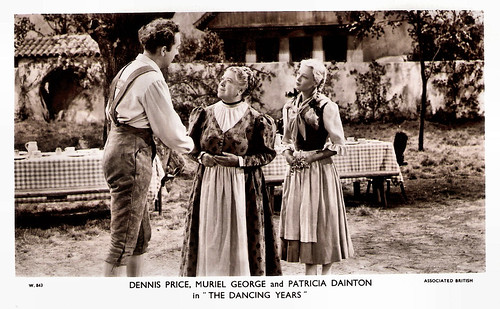
British postcard in the Picturegoer Series, London, no. W. 843. Photo: Associated British. Dennis Price, Muriel George and Patricia Dainton in The Dancing Years (Harold French, 1950).
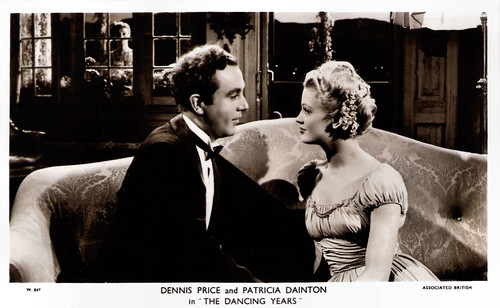
British postcard in the Picturegoer Series, no. W. 847, London. Photo: Associated British. Dennis Price and Patricia Dainton in The Dancing Years (Harold French, 1950), based on a play by Ivor Novello.
Dennis Price's internal anguish about his homosexuality seems to have been the cause of most of his personal problems and heavy drinking and gambling. Bravely he played an upper-class gay in the controversial drama Victim (Basil Dearden, 1961) starring Dirk Bogarde, which portrayed gay men being blackmailed for their ‘crime’.
He became a character actor in such delightful comedies as Private's Progress (John Boulting, 1956), I'm All Right Jack (John Boulting, 1959) with Peter Sellers, and School for Scoundrels (Robert Hamer, 1960) starring Ian Carmichael.
On television he became popular as butler Jeeves in the hit series The World of Wooster (1965-1967) with Ian Carmichael as Bertie Wooster. Scott Palmer at IMDb: "The series, which was a huge success, endeared Price as a new character to a different generation. P.G. Wodehouse, upon seeing it, stated that Dennis Price was "born to play Jeeves", and Wodehouse was pleased no end about the casting."
In 1966, Price was declared bankrupt and moved to the tax haven island of Sark. He paid his debts back, partly by appearing in campy B-films as Vampiros lesbos/Lesbian Vampires (1971) for Spanish cult director Jesus Franco. Price also played Dr. Frankenstein in Franco's Drácula contra Frankenstein/Dracula vs. Frankenstein (Jesus Franco, 1972) and La maldición de Frankenstein/The Curse of Frankenstein (Jesus Franco, 1972) with Howard Vernon.
In October 1973, in his home in the Channel Islands, Price fell and broke his hip. He was taken to hospital in Guernsey where he died, from heart failure as a direct result of the hip fracture. Some sources say that he died of cirrhosis of the liver, but according to Scott Palmer at IMDb his death certificate states that is not the case, as no autopsy was performed. He was survived by two daughters from his marriage to Joan Schofield, Susan Mapp (1940) and Tessa Burnett (1944).
His last film, Son of Dracula (Freddie Francis, 1974) with Ringo Starr, was released the following year. In his nearly forty years spanning career, Dennis Price never seemed to be out of work. He described himself in 1969 in the TV Times as “very nearly Britain’s biggest film star”. One of his better roles in his final years was the quickly disposed of drama critic in Theatre of Blood (Douglas Hickox, 1973).
Glyn Jones adds at her blog Fantastic Voyages: "By the late 1960′s, after experiencing 30 years of ups and downs in British films, Price had seen all too clearly how haphazard the life of a 'movie star' could be. For my money, Dennis Price is up there with Olivier, Richardson, and Guinness as the consummate British actor, but he is now almost a forgotten name, certainly a neglected one, even among film buffs."

British postcard in the "The People" series by Show Parade Picture Service, London, no. P. 1001. Photo: J. Arthur Rank Organisation Ltd.
Trailer Kind Hearts and Coronets (1949). Source: Film365 (YouTube).
Trailer Twins of evil (1971). Source: freyacatoct (YouTube).
Sources: Gary Brumburgh (IMDb), Scott Palmer (IMDb), Brian McFarlane (Encyclopaedia of British Cinema), Glyn Jones (Fantastic Voyages), Wikipedia, and IMDb.

British autograph card. Dennis Price in The Magic Bow (Bernard Knowles, 1946).

British postcard in the "The People" series by Show Parade Picture Service, London, no. P. 1001. Photo: J. Arthur Rank Organisation Ltd.

British postcard by Real Photograph, no. F.S. 29. Photo: Gainsborough Pictures. Publicity still for The Bad Lord Byron (David MacDonald, 1949).
The Army or the Church
Dennis Price was born Dennistoun Franklyn John Rose-Price in 1915, into an upper-class family in Twyford (according to some sources: Ruscomb), England. His father T. Rose-Price was a brigadier-general, and Dennis was expected to make a career for himself in the army or the church.
He was educated at Radley, and at Worcester College, Oxford, where he became a member of the Oxford University Dramatic Society. He did not abide by his family's wishes and decided to become an actor.
Price studied acting at the Embassy Theatre School of Acting. He made his first appearance on stage at the Croydon Repertory Theatre in June 1937, followed by a debut on the London stage in 'Richard II' with John Gielgud in the title role. He was further promoted in the theatre by Noël Coward.
He made his film debut as an extra in the comedy No Parking (Jack Raymond, 1938) with Gordon Harker, and also appeared in early BBC television plays.
In 1939, he met and married the actress Joan Schofield. War put a temporary halt to his acting career. In 1940, he joined the Royal Artillery, where he served until he was wounded in 1942. His brother Arthur Thomas Rose-Price, who had joined the RAF as Flying Officer RAF, was shot down and killed in the Battle of Britain.

British postcard.

Dutch postcard. Photo: Eagle Lion.

Belgian collectors card, no A 69. Photo: J. Arthur Rank Organisation.

British postcard in the Picturegoer Series, London, no. W. 300. Photo: J. Arthur Rank Organisation.
Cold, Refined, Urbane and Elegant
Dennis Price resumed his career in 1942, touring with Noël Coward in 'This Happy Breed,' and other plays Coward's company produced. Then he was cast by Michael Powell for one of the leading parts in his war drama A Canterbury Tale (Michael Powell, Emeric Pressburger, 1944) with Eric Portman and Sheila Sim. The film was not a box office hit but is now regarded as one in a number of Powell & Pressburger classics.
He impressed Gainsborough Pictures, which put him under contract. According to Brian MacFarlane at BFI screenonline, Price was "mercilessly used by Gainsborough [Pictures] in one unsuitable role after another (hopeless at costume heroes, better as villains such as Sir Francis in Caravan, d. Arthur Crabtree, 1946)".
He starred in such Gainsborough melodramas as A Place of One's Own (Bernard Knowles, 1945), which also starred Margaret Lockwood. They had an affair which carried on during the subsequent films they made together: Hungry Hill (Brian Desmond Hurst, 1946), The White Unicorn (Bernard Knowles, 1947), and Jassy (Bernard Knowles, 1947). Lockwood stated in an interview in 1984: "We were both married with small children, so we decided to call it off."
Then Price played Louis D'Ascoyne Mazzini, who schemes to murder those who stand in line to his becoming the Duke of Chalfonta, in Kind Hearts and Coronets (Robert Hamer, 1949). He kills nearly all of Alec Guinness' eight characters. According to Scott Palmer at IMDb: "This was considered Ealing's masterpiece, and, although Alec Guinness is remembered for his eight different characters, it's really Price who dominates the film with his cold, refined, urbane and elegant performance and narration."
Kind Hearts and Coronets was a triumph, but the showcase role in The Bad Lord Byron (David MacDonald, 1949). that could have led him to Hollywood, flopped. He fell into a severe depression. His marriage to actress Joan Schofield of eleven years ended in 1950, and four years later he attempted suicide in his Kensington flat in a gas oven. Fortunately a servant found him in time.
Price was still appearing on the stage quite often, and made his Hollywood debut in Bell, Book and Candle (1951). Scott Palmer at IMDb: "The Intruder (1953) was another good film which reunited him with Jack Hawkins, although by now he was getting somewhat smaller roles and those he starred in were B pictures. Still drinking and depressed, he attempted suicide in 1954 in his Kensington flat in a gas oven; fortunately a servant found him in time. He resumed his career immediately, appearing in such films as That Lady (Terence Young, 1955), with Olivia de Havilland, and the war comedy Private's Progress (John Boulting, 1956) with Ian Carmichael, and in 1957 he scored a big success while touring South Africa as Major Pollock in the play 'Separate Tables'."
Price also made another film with Jack Hawkins that year, Fortune Is a Woman/She Played with Fire (Sidney Gilliat, 1957) with Arlene Dahl in the title role. By now he was showing a great flair for character roles, sometimes comedic. Some very good films came along, such as The Naked Truth (Mario Zampi, 1957) starring Terry-Thomas and Peter Sellers, Danger Within (Don Chaffey, 1959) with Richard Todd, I'm All Right Jack (John Boulting, 1959), Tunes of Glory (Ronald Neame, 1960) starring Alec Guinness and John Mills, The Millionairess (Anthony Asquith, 1960) featuring Sophia Loren, and School for Scoundrels (Robert Hamer, 1960).

Italian postcard by Rotalfoto, Milano (Ediz. Garami), no. 5. Photo: Eagle Lion Films / Arthur Rank Organisation.

British postcard in the Picturegoer Series, London, no. W. 843. Photo: Associated British. Dennis Price, Muriel George and Patricia Dainton in The Dancing Years (Harold French, 1950).

British postcard in the Picturegoer Series, no. W. 847, London. Photo: Associated British. Dennis Price and Patricia Dainton in The Dancing Years (Harold French, 1950), based on a play by Ivor Novello.
Controversial Drama
Dennis Price's internal anguish about his homosexuality seems to have been the cause of most of his personal problems and heavy drinking and gambling. Bravely he played an upper-class gay in the controversial drama Victim (Basil Dearden, 1961) starring Dirk Bogarde, which portrayed gay men being blackmailed for their ‘crime’.
He became a character actor in such delightful comedies as Private's Progress (John Boulting, 1956), I'm All Right Jack (John Boulting, 1959) with Peter Sellers, and School for Scoundrels (Robert Hamer, 1960) starring Ian Carmichael.
On television he became popular as butler Jeeves in the hit series The World of Wooster (1965-1967) with Ian Carmichael as Bertie Wooster. Scott Palmer at IMDb: "The series, which was a huge success, endeared Price as a new character to a different generation. P.G. Wodehouse, upon seeing it, stated that Dennis Price was "born to play Jeeves", and Wodehouse was pleased no end about the casting."
In 1966, Price was declared bankrupt and moved to the tax haven island of Sark. He paid his debts back, partly by appearing in campy B-films as Vampiros lesbos/Lesbian Vampires (1971) for Spanish cult director Jesus Franco. Price also played Dr. Frankenstein in Franco's Drácula contra Frankenstein/Dracula vs. Frankenstein (Jesus Franco, 1972) and La maldición de Frankenstein/The Curse of Frankenstein (Jesus Franco, 1972) with Howard Vernon.
In October 1973, in his home in the Channel Islands, Price fell and broke his hip. He was taken to hospital in Guernsey where he died, from heart failure as a direct result of the hip fracture. Some sources say that he died of cirrhosis of the liver, but according to Scott Palmer at IMDb his death certificate states that is not the case, as no autopsy was performed. He was survived by two daughters from his marriage to Joan Schofield, Susan Mapp (1940) and Tessa Burnett (1944).
His last film, Son of Dracula (Freddie Francis, 1974) with Ringo Starr, was released the following year. In his nearly forty years spanning career, Dennis Price never seemed to be out of work. He described himself in 1969 in the TV Times as “very nearly Britain’s biggest film star”. One of his better roles in his final years was the quickly disposed of drama critic in Theatre of Blood (Douglas Hickox, 1973).
Glyn Jones adds at her blog Fantastic Voyages: "By the late 1960′s, after experiencing 30 years of ups and downs in British films, Price had seen all too clearly how haphazard the life of a 'movie star' could be. For my money, Dennis Price is up there with Olivier, Richardson, and Guinness as the consummate British actor, but he is now almost a forgotten name, certainly a neglected one, even among film buffs."

British postcard in the "The People" series by Show Parade Picture Service, London, no. P. 1001. Photo: J. Arthur Rank Organisation Ltd.
Trailer Kind Hearts and Coronets (1949). Source: Film365 (YouTube).
Trailer Twins of evil (1971). Source: freyacatoct (YouTube).
Sources: Gary Brumburgh (IMDb), Scott Palmer (IMDb), Brian McFarlane (Encyclopaedia of British Cinema), Glyn Jones (Fantastic Voyages), Wikipedia, and IMDb.
No comments:
Post a Comment